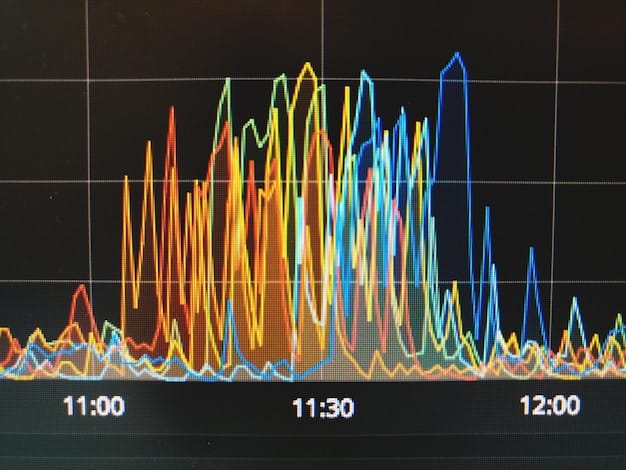Budgeting with Irregular Income: Strategies for Stability in 2025

Budgeting with irregular income requires proactive strategies, including forecasting income, prioritizing needs over wants, creating a flexible budget, building an emergency fund, and utilizing budgeting apps to achieve financial stability in 2025.
Navigating finances with an unpredictable income can feel like walking a tightrope. However, with the right strategies, you can transform the uncertainty into an opportunity for financial empowerment. Let’s explore budgeting with irregular income: strategies for managing cash flow and achieving financial stability in 2025.
Understanding the Challenges of Irregular Income
Irregular income presents unique challenges to traditional budgeting methods. Unlike those with stable salaries, individuals with variable income streams must contend with fluctuations that can impact their ability to cover expenses and save for the future. Understanding these hurdles is the first step toward creating an effective budget.
Identifying Sources of Irregular Income
The first step in managing an irregular income is understanding where it comes from. Irregular income can arise from a variety of sources, each with its own unique characteristics.
- Freelance Work: Income from freelance projects can vary widely based on the number of clients, project scope, and payment terms.
- Commission-Based Sales: Sales commissions fluctuate depending on sales performance, market conditions, and seasonality.
- Contract Work: Contract work offers project-based income, but the availability of contracts can vary.
- Seasonal Employment: Seasonal jobs like tourism or agriculture provide income during specific periods of the year, with lulls in between.
Recognizing the sources of your income and their typical cycles allows you to anticipate fluctuations and plan accordingly.

Psychological Impact of Income Variability
Beyond the practical challenges, irregular income can also take a toll on mental well-being. The uncertainty surrounding income can lead to stress, anxiety, and difficulty making long-term financial decisions. Recognizing these psychological effects is crucial for maintaining a healthy relationship with your finances.
By understanding the challenges and sources of irregular income, you can lay the groundwork for implementing effective budgeting strategies. Recognizing the psychological impact is equally important for maintaining financial well-being.
Forecasting Your Income: Predicting the Unpredictable
Accurately forecasting your income is crucial when dealing with irregular income. Although it may seem counterintuitive to predict an unpredictable income, various techniques exist to help you estimate your earnings with greater accuracy. A reasonable forecast allows you to proactively prepare for periods of high and low income, ensuring that you meet your financial obligations.
Analyzing Past Income Trends
One of the most effective ways to forecast your income is to analyze your past income trends. Reviewing your income records from previous months or years can reveal patterns and seasonality that you might not have noticed otherwise. Consider tracking your income on a spreadsheet or using budgeting software to visualize trends.
Using Averaging Techniques
Averaging techniques can also help you smooth out income fluctuations and create a more predictable budget. Several averaging methods can be employed:
- Simple Average: Calculate the average income over a specific period (e.g., the last three months). This provides a straightforward estimate of your typical earnings.
- Weighted Average: Assign greater weight to more recent income figures, reflecting current trends. This can be useful if your income has been steadily increasing or decreasing.
- Rolling Average: Calculate the average income over a fixed period that rolls forward each month. This helps to smooth out short-term fluctuations and identify longer-term trends.
Considering External Factors
In addition to analyzing past income trends, it’s important to consider external factors that may impact your future earnings. These include:
- Market Conditions: Economic trends, industry changes, and competition can all impact your income potential.
- Seasonality: Certain industries experience seasonal fluctuations in demand, which can affect your income.
- Personal Factors: Changes in your workload, client base, or pricing strategy can also impact your earnings.
Effective forecasting is the cornerstone of budgeting with irregular income. By analyzing past trends, utilizing averaging techniques, and considering external factors, you can create a more reliable income estimate and manage your finances proactively.
Prioritizing Needs Over Wants: Essential Spending Strategies
When managing an irregular income, it’s essential to differentiate between needs and wants. Needs are essential expenses necessary for survival and basic well-being, while wants are discretionary purchases that enhance your quality of life. Prioritizing needs ensures you cover essential expenses even during low-income periods.
Identifying Essential Expenses
Essential expenses are the foundation of any budget, particularly when dealing with an irregular income. These are the costs you must cover to maintain your basic standard of living.
- Housing: Rent or mortgage payments, property taxes, and homeowners insurance.
- Food: Groceries and essential household items.
- Utilities: Electricity, water, gas, and internet.
- Transportation: Car payments, insurance, gas, public transportation fares, or bike maintenance.
Reducing Discretionary Spending
Discretionary spending, or wants, includes non-essential expenses that can be reduced or eliminated to free up cash flow. Identifying and reducing these expenses is a critical step in managing an irregular income.
Prioritizing needs over wants is a fundamental principle of budgeting with irregular income. By distinguishing between essential and discretionary expenses, you can ensure that your basic needs are always met, even during periods of reduced income.
Creating a Flexible Budget: Adapting to Changing Circumstances
A flexible budget is essential for managing irregular income. Unlike static budgets that assume stable income, flexible budgets are designed to adapt to changing circumstances. These budgets allow you to adjust your spending based on your actual income, providing greater control over your finances.
Zero-Based Budgeting
Zero-based budgeting (ZBB) is a budgeting method where you allocate every dollar of income to a specific expense or savings category. Each month, you start with a zero balance and allocate funds based on your priorities. ZBB is particularly useful for irregular income because it requires you to evaluate your spending habits and make conscious decisions about where your money goes.
Creating a flexible budget involves setting up different spending scenarios based on varying income levels. By planning for different scenarios, you can minimize financial stress and stay on track toward your goals, regardless of income fluctuations.
Implementing the Envelope System
The envelope system is a cash-based budgeting method that involves allocating specific amounts of cash to different spending categories, such as groceries, transportation, and entertainment. When the money in an envelope is depleted, you stop spending in that category until the next budgeting cycle.
Creating a flexible budget is a cornerstone of managing irregular income. By utilizing zero-based budgeting, scenario planning, and the envelope system, you can adapt your spending to changing circumstances and maintain financial stability.
Building an Emergency Fund: Your Financial Safety Net
An emergency fund is a savings account specifically designated for unexpected expenses, such as medical bills, car repairs, or job loss. For individuals with irregular income, an emergency fund is essential for bridging the gap between income fluctuations and preventing debt accumulation. Having a financial cushion provides peace of mind and prevents minor setbacks from derailing your finances.
Determining the Right Amount for Your Fund
The ideal size of your emergency fund depends on your individual circumstances, including your monthly expenses, income stability, and risk tolerance. A common recommendation is to save three to six months’ worth of essential living expenses. For those with irregular income, aiming for the higher end of this range may provide greater security.
Automating Savings Contributions
Automating savings contributions is one of the most effective ways to build an emergency fund, particularly when dealing with irregular income. Set up automatic transfers from your checking account to your savings account on a regular basis. Even small, consistent contributions can add up over time.
Building an emergency fund requires discipline and patience, but the peace of mind and financial security it provides are well worth the effort.
Utilizing Budgeting Apps: Tools for Financial Insights
Budgeting apps can be invaluable tools for managing irregular income. These apps provide a range of features, including income tracking, expense categorization, bill reminders, and financial reporting. By using budgeting apps, you can gain valuable insights into your spending habits, identify areas for improvement, and monitor your progress toward your financial goals.
Tracking Income and Expenses
One of the primary benefits of budgeting apps is their ability to track income and expenses automatically. Many apps can connect to your bank accounts and credit cards, importing transactions in real-time. This eliminates the need for manual data entry and provides an up-to-date view of your financial activity.
Setting Financial Goals
Budgeting apps can also help you set and track financial goals, such as saving for a down payment, paying off debt, or building an emergency fund. Set realistic goals based on your income and expenses, and monitor your progress regularly.
Budgeting apps offer a wealth of features to help you manage irregular income effectively. By tracking income and expenses, creating budgets, visualizing spending patterns, setting financial goals, and receiving personalized insights, you can gain greater control over your finances and achieve your financial aspirations.
| Key Point | Brief Description |
|---|---|
| 💰 Income Forecasting | Predict income using past trends and external factors. |
| ✅ Prioritize Needs | Focus spending on essential expenses first. |
| 🧮 Flexible Budget | Adjust your budget based on income fluctuations. |
| 🛡️ Emergency Fund | Build a financial safety net for unexpected expenses. |
Frequently Asked Questions
▼
Start by analyzing income trends from past months or years, using averaging techniques, and considering external factors like market conditions that may affect future earnings.
▼
Distinguish between needs and wants. Needs include housing, food, and utilities, while wants are discretionary spending. Prioritize needs to ensure essential expenses are always covered.
▼
Flexible budgets adjust spending based on actual income. Methods like zero-based budgeting require you to allocate every dollar, ensuring you’re consciously deciding where your money goes.
▼
Aim to save three to six months worth of essential living expenses. If you have irregular income, it is wiser to target the higher end to secure a financial cushion.
▼
Budgeting apps provide various features, including income and expense tracking, expense categorization, bill reminders, and financial reporting, helping you gain insights and monitor financial progress.
Conclusion
Mastering budgeting with irregular income for financial stability in 2025 requires proactive approaches. By forecasting your income, prioritizing essential needs, creating a flexible budget, building a robust emergency fund, and utilizing budgeting apps, you can confidently navigate the ups and downs of a variable income and achieve your financial goals.





